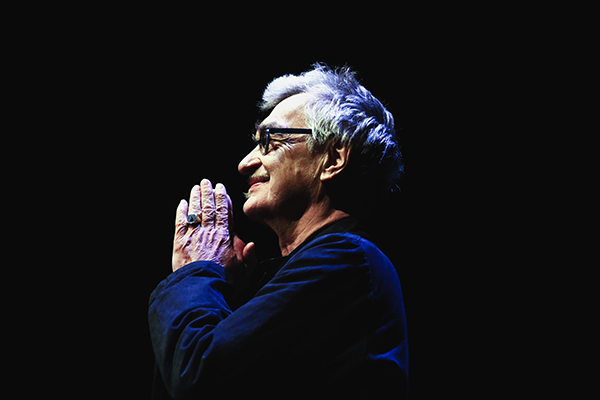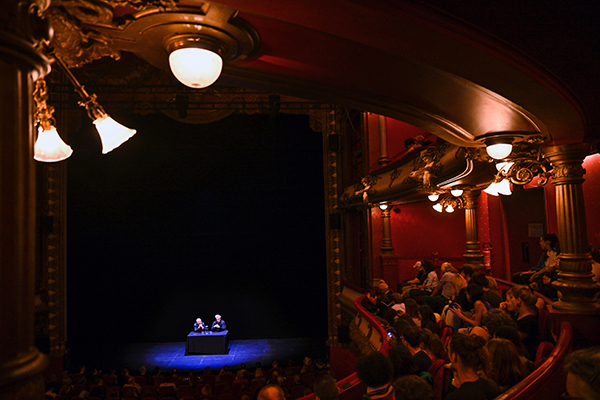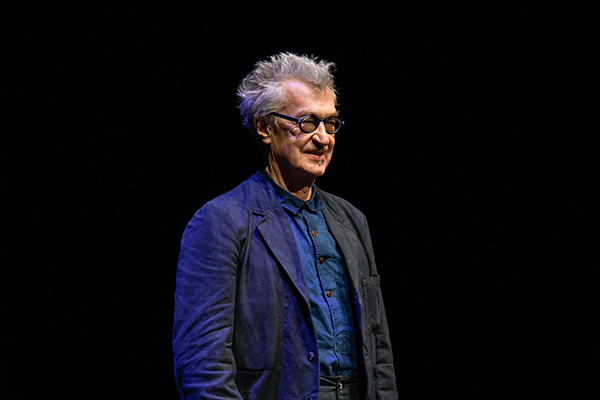Conversation
Wim Wenders
“My job is to pass on the virus” of cinema
Posted on 21.10.2023
"A vision of the world enables viewers to understand it better; if not to change it, at least to improve it. After all, the question of cinema is how to live better." Highlights from a superb Master Class, full of life and infused with Wim Wenders' quiet humour.
A SURVIVOR IN THE HISTORY OF CINEMA?
Sometimes one feels like a dinosaur that no longer exists, yes. I tell myself above all that I was lucky enough to work with some incredible people, with the first camera that shot with sound, I saw the arrival of digital, of 3D. Yes, I survived, but above all, perhaps, I experienced it.
WHAT MATTERS: THE NEXT FILM
The work I want to make is the next one. The rest is repetition. My life's goal was to be a painter until I attended a talk by Henri Langlois. I knew nothing about cinema and a year later I knew a lot more. I said goodbye to painting and welcomed cinema. I'd be a different person if I'd stayed in the painter's studio. One day I went to Les Deux Magots - I didn't have any money and I swiped a German newspaper. It contained the address of a film school in Germany and miraculously I got in - there were 20 of us. They turned down Fassbinder! But we made three miserable shorts while he had already made three feature films! He wouldn't have survived that school. As for Werner Schroeter, he left and told me he was wasting his time.
We each got 15,000 marks for our graduation film, which wasn't bad for making a short, and I had calculated that if I filmed each shot just once, I'd have enough to make a 100-minute film. But I managed to do 2.5 hours, and I still haven't figured out why... This first film, which nobody has seen, is really influenced by Cassavetes, except in the camera work. I'd put everything in it: Van Morrison, Presley, the Stones... so there are a few rights problems. As for The Goalie’s Anxiety, the following film, it was ‘Hitchcock’ style, but without the suspense!
Let's not talk about the third one, The Scarlet Letter. I realised that I wasn't any good at historical costume films. We shot in a Western village near Madrid and it was a disaster; every day I wanted to leave.
 © Olivier Chassignole
© Olivier Chassignole
POLITICS
I became political at school, and we occupied the school in May 1968. We demanded that we be taught cinema and nothing else because it was a communications school, so to speak. There wasn't a single camera in the school, just imagine! And that changed! The school has become very good. I'd sold my second-hand saxophone - because I wanted to be Coltrane - to buy a 16mm camera. Nobody had a camera so they all borrowed mine. So, I was the chief operator on all these films because I didn't want to let the others use it. But it was lost during the events and I don't know what happened to it.
I was the only one who was ‘politicised’. We even went on a big trip to Italy to meet our Italian fellow students. There were about fifty students there and I took up a position and was part of the non-violent group. The whole movement had a suicidal side. It was a very difficult time in my life.
ALICE IN THE CITIES
I only put ‘director’ in the credits of this fourth film; before that I didn't put anything. We were part of the young German cinema, even if it can't be compared to Chabrol, Varda, Truffaut, Godard and Rivette in France.
There was no jealousy between Fassbinder, Werner Herzog and myself because we had nothing in common; the success of each one of us helped the others, we were united. We showed each other our films: Fassbinder woke me up one night to see The Marriage of Maria Braun. We had a sort of tradition of seeing each other’s films first.
AMERICAN PERIOD
I had wanted to leave Germany; I had always wanted to leave. First, I went to France, then I went to the promised land... I was 33 and I spent eight years in the United States. In the end, it was an essential lesson in my life because I realised that I was never going to become an American, to make American movies, because in my body and in my soul, I was a romantic German. I made Paris, Texas with my own rules, my own production, I had the best in the world and I made the film for which I had gone to the United States. And I came back with my head held high, as a director who belongs to the tradition of European cinema.
After Paris, Texas, I'd fallen into the trap of working as an employed director with a big budget that allows you not to do what you want. Francis Ford Coppola didn't want to fire me. We were both stubborn, but we stuck it out to the end, and our friendship survived. I wasn't comfortable with this career, whereas I was very comfortable with Paris, Texas, which I had made flying under the radar.
As far as Hammett is concerned, this is perhaps one of the few films in the history of cinema that was shot twice. The first time was on location in the streets of San Francisco with Francis, a producer who was extremely busy editing Apocalypse Now. I did my best, and Francis had told me that he'd hired me because of The American Friend, so I did something like that.
At the end, he told me he didn't recognise the screenplay he'd read. He wasn't sure about the ending. When I did it, he criticised me for its lack of action... I had to wait a year for the actor who'd left to act in One from the Heart to slim down again after having put on weight for Francis' film. Fred Forrest lost weight, three scriptwriters worked on it, but Francis and I weren't convinced. The moral of the story is that even if you have a lot of money, it doesn't necessarily work. Afterwards, I produced all my own films, which was a great lesson, and I'm very grateful to Francis for that.
 © Olivier Chassignole
© Olivier Chassignole
INDEPENDENT FILMS
In fact, as we hear from one of the testimonials in the wonderful film Room 999: "The history of cinema is made by small films", with a few major exceptions such as 2001: A Space Odyssey. But on the whole, big productions have not advanced the history of cinema.
Until the End of the World was perhaps my most extensive production. It took me 12 years to produce it and I'm quite proud of it. Perfect Days was written in three weeks, shot in fifteen days and only took three months to edit. This time last year we were in the middle of shooting. Small films can become the most memorable because you don't think too much about them. I shouldn't say that, but in my life, it hasn't helped me much to think. And in my life, I've never wanted to do things because I knew how to do them, I don't think you should do that.
ABOUT CINEMATOGRAPHER ROBBY MÜLLER
He was a great cinematographer and we made a lot of films together. He made his first feature film with me. We worked together for thirty years. Not for Hammett, because he wasn't unionised, but for Paris, Texas. He became a great role model for a whole generation of cinematographers. He invented lighting, the Kino Flow, improvised with neon lights. He made one of his finest films with Barbet Schroeder, Barfly, and I thought he was brilliant, better than he was with me. He has remained a legend, and our last collaboration was on Buena Vista Social Club because he filmed the concerts in Amsterdam. He was a bit like my twin brother in cinema. With him, I realised that it was more interesting to learn with the same people. This has been the case with many of the technicians I've worked with because we could really move forward. I've always recommended this to directors: if it goes well, try making your second film with the same team.

© Jean-Luc Mège
Jim Jarmusch
Jim was often in our office in New York, and he often went near our refrigerators because there were three large unused reels left over from The State of Things. I said to him, "What would you do with this?" and he replied that he would make a film. Using the reels from The State of Things, he won the Camera d'Or the same year that I won the award for Paris, Texas (1984).
Truffaut
Of course, American cinema has influenced my life, but it has to be said that François Truffaut has too. The first telegram I received when I won my prize in Venice came from him. He had a profound sense of ethics and he had a huge influence on my belief in the European language as being a part of my craft. I dedicated Wings of Desire to him, and to other directors.
PASSING DOWN MEMORY
I've always wondered how other people did it - how the great painters and directors developed their language. When I saw a Pina Bausch play for the first time, my girlfriend at the time had forced me to go. I was already bored before it even started and then I found myself in tears. I realised that a film had never moved me to that extent. So I wanted to know – ‘What does this woman do, what does she know’? I met her and we became friends. But my big question was always: what was her process? It was a different vocabulary. It's the same for Anselm Kiefer or Salgado, even though I'm a photographer myself. You're still limited to your own vision and it's a great adventure to enter into someone else's. The great adventures today are really the human spirit, the artists, the Pope... How does their imagination work? I wanted to pass on the virus to people who have nothing to do with dance. That's what I mean by passing on a virus - that's kind of my job in the cinema.
Propos recueillis par Charlotte Pavard

